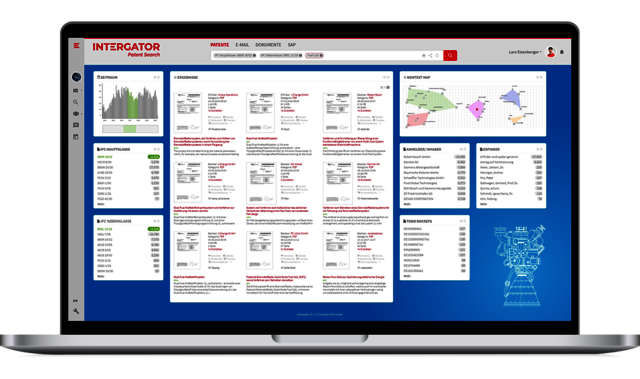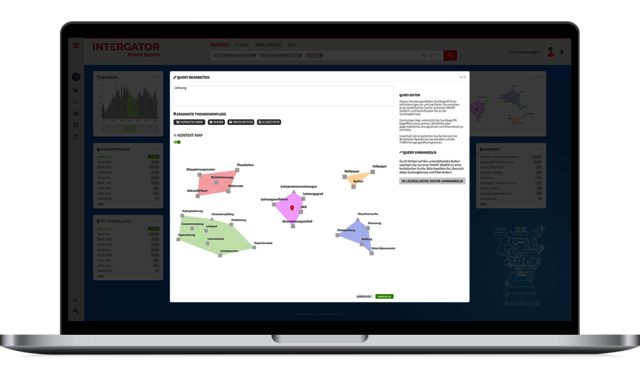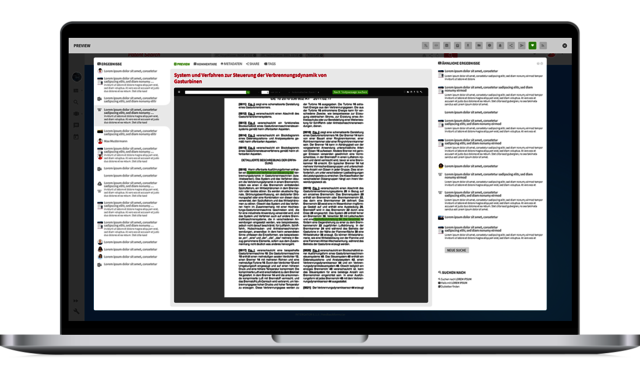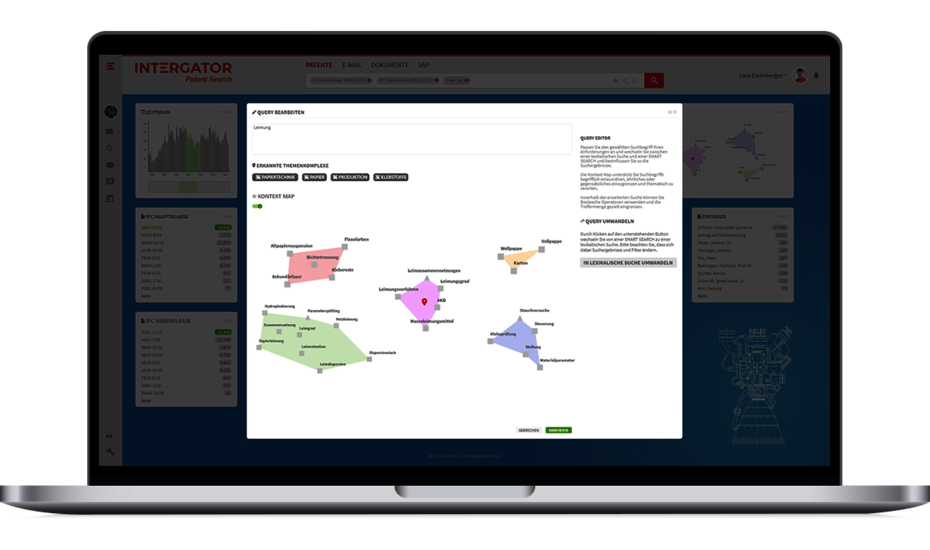INTERGATOR Patent Search
With more than 19,000 patents or utility models submitted, Germany in 2019 ranked fourth among the countries with the most submissions in a worldwide comparison and first in Europe. Statistically, hardly any other country has more applications per inhabitant than Germany, and the number of applications is increasing every year. For many companies, patent searches have become part of a successful business strategy. Not only can technical trends be deduced from them, but also competitors or potential cooperation partners can be observed.
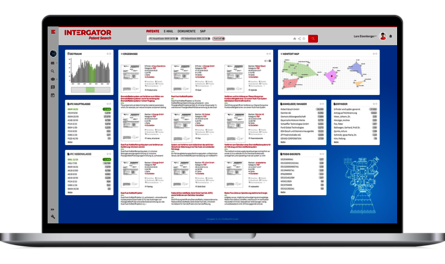
A new search approach
With the Smart Map INTERGATOR Patent Search has a novel possibility to visualize documents in clusters and thus to limit results optically and thematically. In addition, hits can be narrowed down with just a few clicks using filters and facets, or a targeted search for patent numbers can be conducted.
INTERGATOR Patent Search technology is already being used today as a pilot solution at the German Patent and Trademark Office (DPMA). You too can profit from the possibilities of a professional search tool. Increase your preliminary examination the probability of a positive patent application or search for new technology concepts and patents.
- AI-based semantic search with terms and whole documents
- interactive-visual search: visual representation of relationships between relevant terms & documents in a Smart Map
- cross-lingual search (German<->English)
- patent-specific language models including multi-word terms
What you can achieve with INTERGATOR Patent Search
When searching for the state of the art, companies often research at different points in time in development processes how mature the current state of the technology is and whether possible duplication of research and development work can be avoided. INTERGATOR Patent Search supports you with a holistic concept search when searching for thematically relevant patents and helps you get a better overview of the current state of the art.
In the run-up to a new development, patent examiners and patent departments check whether the own development represents a novelty compared to already published ones and whether it should be pursued further. As a rule, if two or three similar applications are filed, the novelty search is discontinued and the further development is examined. The novel approach of INTERGATOR Patent Search documents not primarily indexing by the terms used, but rather putting them into a context of content, allows for a more comprehensive search and evaluation of whether the product to be examined has the character of a novelty. Therefore, for your searches, use a solution that is used at the DPMA by experienced patent examiners and thus minimize the risks of rejection or check the prior art and patentability in advance.
If patent applications submitted are rejected by the patent office, the patent departments often begin to prepare oppositions and develop strategies to legally challenge patents. In this process, all relevant information and publications are collected and reviewed before the priority date of the patent. INTERGATOR Patent Search offers not only the search in a constantly growing data pool but also the integration of additional information sources, which can also be searched using modern AI search algorithms.
In the course of developing new products or technologies, companies often conduct preliminary research to determine whether the technology to be patented infringes on existing patents and whether there is a threat of possible legal action by the owners. In addition to the thematic concept search within the patent portfolio, INTERGATOR Patent Search offers fast and efficient filtering of hits and thus facilitates the search. In addition to searching for active patents, the freedom-to-operate search extends the search to already expired patents, since technologies that have been protected up to now may be free after the expiration of the protection period and can be used for your own products. By means of the integrated period facets, expired patents can be easily narrowed down in the hit list.
Patent searches are also used by many companies to monitor competition or technical trends. What is the competition doing? Which possible products can be derived from patent applications and what is the expertise in this field? Potential sales markets, product lines and developments can be derived from this data and possible countermeasures can be taken. An additional challenge is that changes of name or the founding of new companies that act as patent holders make a search costly. INTERGATOR Patent Search facilitates this monitoring by means of various solutions, filters and facets and thus allows the targeted monitoring of the market environment.
Especially the observation of entire patent families and similar family members (equivalents) is facilitated by the thematic context search of INTERGATOR Patent Search, since contents are grouped into clusters based on the terms used in the document. However, similar documents are not necessarily generated from the occurrence of search terms within the patent, but due to their thematic proximity.
Monitoring citations can also be a worthwhile research opportunity. Where are own patents cited? In which patents are references to own patents or technologies (in the form of citations)? Here INTERGATOR Patent Search offers intuitive search options and an efficient way to find possible infringements.
The AI search for the needle in the haystack
All these challenges - complex searches, fuzzy terms, deliberate obfuscation - make it difficult to formulate adequate search queries that find all relevant fonts, but also do not produce too many non-relevant hits, which generates a lot of effort in evaluating the search results.
INTERGATOR Patent Search therefore goes a new way and extends the search with artificial intelligence and modern search concepts. In contrast to searches based on exact terms, the Patent Search takes a broader approach and processes patents in a context. In doing so, the documents are compared to a machine learning model in the context of their terms and thus similar documents are found faster and better. Conceptual inaccuracies, thematic fuzziness, deliberate concealment are no problem for INTERGATOR Patent Search. Instead, the patent search offers hits that sometimes even better match the search term than an exact search could have done.
Technologically INTERGATOR Patent Search independently extracts the most relevant terms from each document and transfers them to a vector in a vector space model generated by neural networks. Search hits are thus formed from similarly positioned vectors regardless of whether the term occurs in this document or not. The decisive factor is the context of the document and its content orientation.
Banks, Banks, Banks
The following example shows the vagueness of human language. A term sometimes has several meanings, which, when taken out of context, produce only poor hits and make it difficult to conduct fast and extensive searches in very large databases.
INTERGATOR Patent Search calculates a model and assigns documents to different clusters based on the terms contained in them. In this way inaccurate terms are assigned to a concept and search hits are listed more precisely. Using the integrated Smart Map you can then refine the search hits or add additional similar documents to your search.
